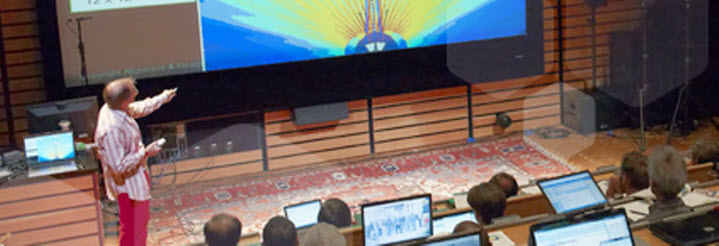
This page is intended to show current bookings for my public seminars and trainings. The majority of my seminars are the SIM3 Training and System Design, a 4-day event. I am also available for other subjects as well and can customize trainings for individuals and companies as desired. Please contact me.
Currently scheduled training seminars
For information or to register go here.
SIM3 Training and System Design: Course Description
This course is designed to empower audio engineers with the understanding of how sound systems are analyzed and optimized. The concentration is on how to enact a practical methodology to system tuning that incorporates the vast power available to us through the modern FFT analyzer. The course features hands-on system tuning and focuses on the causes of the problem we face, not just simplistic solutions. The process of of learning how to optimize systems reveals improved methods for system design. The SIM3 course is not an infomercial or sales presentation. It is four days of intensive focus on how to get the most practical benefit from these tools. There is lots of theory, but all of it is applied to the task at hand: designing sound systems that CAN provide uniform response over the space and then using the analyzer to do it.
What you will learn:
1 ) How to configure and operate the Meyer Sound SIM3 Analyzer hardware and software
2 ) The acoustical physics needed to comprehend the data on the screen and its implications to design and tuning
3 ) How to design systems that are optimizable
4 ) How to tune systems that are properly designed
5 ) How to tell what cannot be tuned
6 ) How to read a phase response and what to do with it
7 ) Alignment of crossovers, including subwoofer phase alignment
8 ) Design and optimization of small and large arrays, including line arrays
9 ) Delay settting, level setting, equalization, speaker positioning and acoustical treatment techniques
10 ) Improved listening skills by linkage of what we hear to what we see on the analyzer
11) How our ears decode tonal content of sound, localize sources and detect reflections
12) How to run a full battery of test and troubleshooting techniques for electronics and speakers such as distortion, polarity, dynamic range and more
13) Strategies for mic placement to provide unform coverage throughout the room
Who should attend?
Sound system designers, system engineers, mix engineers, wear-a-lot-of-hats engineers. Anyone who wants to dramatically increase their understanding of how sound systems interact in their rooms and with their ears. If you design systems, tune them and/or mix on them you stand to benefit from this class.
Who should not attend?
Marketing managers, and people who believe the claims of Bose or Monster Cable (unless you are ready to take a lot of jokes)
Most frequently asked question (MFAQ)
Is it OK to attend the class if I don’t own a SIM System, or (gulp) if I use a different analyzer such as SMAART, Sys-Tune, or Spectrafoo?
Yes. You will (a) learn how to get much more out of your current tools and (b) you will have a clear understanding of the features and benefits available to you with SIM3. Maybe you will buy (or spec) a SIM3 System after the class. Maybe not.
Other FAQ
What if my math skills suck?
You will be in good company. Most students in these classes speak physics as a second language….or third, or fourth. The course provides way to visualize our audible experience without differential equations. Lots of graphics, lots of screen data and my whiteboard.
What if I am not a Meyer guy?
Not being a guy is fine. Also not being a Meyer user is fine. The seminar uses Meyer signal processing and speakers but the laws of physics apply equally to all manufacturers (except for the one I mentioned above).
Some samples of subjects covered in the course














